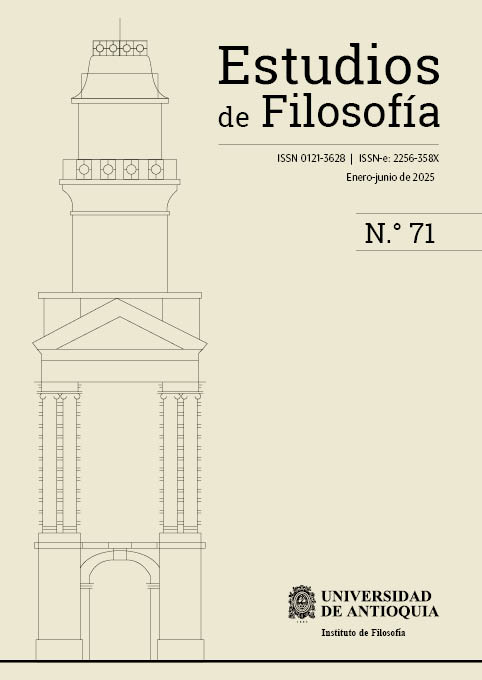Responsivity and co-responsivity from a phenomenological perspective
DOI:
https://doi.org/10.17533/udea.ef.358694Keywords:
responsivity, otherness, pathos, co-affection, sociality, the extraordinaryAbstract
In this article, I will use terms such as “responsive” and “responsivity”, that became indispensable for my own thinking when I tried to develop a theory of radical Fremdheit. In this article I develop the basic features of this responsivity in which others are involved. Methodologically, I am guided by a variant of responsive phenomenology that is to be understood as a phenomenology grounded in the body. Crucial to this is the descent into a radical form of experience that precedes all constructs and models, as well as its own theory.
Downloads
References
Bachtin, M. M. (1979). Das Wort im Roman. In M.M. Bachtin, Ästhetik des Wortes (hg. und übersetzt von R. Grübel). Suhrkamp.
Bedorf, Th. (2003). Dimensionen des Dritten. Sozialphilosophische Modelle zwischen Ethischem und Politischem. Wilhelm Fink.
Elias, N. (1987). Die Gesellschaft der Individuen. Suhrkamp.
Freud, S. (1940). Massenpsychologie und Ich-Analyse (GW 13). Fischer Verlag.
Goldstein, K. (2014). Der Aufbau des Organismus. Einführung in die Biologie unter besonderer Berücksichtigung der Erfahrungen am kranken Menschen. Wilhelm Fink. https://doi.org/10.30965/9783846752814
Heidegger, M. (2007). Sein und Zeit. Max Niemeyer Verlag.
Hénaff, M. (2009). Der Preis der Wahrheit. Gabe, Geld und Philosophie (übersetzt von E. Moldenhauer). Suhrkamp.
Husserl, E. (1950). Cartesianische Meditationen und Pariser Vorträge (Hua I). Martinus Nijhoff.
Husserl, E. (1954). Die Krisis der europäischen Wissenschaften und die transzendentale Phänomenologie (Hua VI). Martinus Nijhoff.
Jabès, E. (1987). Le livre des marges. LGF/Le Livre de Poche.
Köhler, W. (1963). Intelligenzprüfungen an Menschenaffen. Springer. https://doi.org/10.1007/978-3-662-00969-7
Levinas, E. (1992). Jenseits des Seins oder anders als Sein geschieht (übersetzt von Th. Wiemer). Verlag Karl Alber.
Mauss, M. (1975). Die Gabe. Form und Funktion des Austauschs in archaischen Gesellschaften. In M. Maus, Soziologie und Anthropologie, Bd. II. Gabentausch, Soziologie und Psychologie, Todesvorstellungen, Körpertechniken, Begriff der Person. Hanser.
Merleau-Ponty, M. (1976). Die Struktur des Verhaltens (übersetzt von B. Waldenfels). De Gruyter. https://doi.org/10.1515/9783110833102
Merleau-Ponty, M. (1986). Das Sichtbare und das Unsichtbare (übersetzt von R. Giuliani und B. Waldenfels). Wilhelm Fink.
Merleau-Ponty, M. (1994). Keime der Vernunft, Vorlesungen an der Sorbonne 1949-1952. Wilhelm Fink. https://doi.org/10.30965/9783846729274
Nietzsche, F. (1980). Kritische Studienausgabe (KSA) (hg. Von G. Colli,und M. Montinari). Deutscher Taschenbuch Verlag; De Gruyter.
Pape, C. (2015). Autonome Teilhaftigkeit und teilhafte Autonomie. Der Andere in M. Bachtins Frühwerk. Wilhelm Fink. https://doi.org/10.30965/9783846758946
Patočka, J. (1988). Ketzerische Essays zur Geschichte und andere Schriften. Klett-Cotta.
Plessner, H. (1982). Lachen und Weinen. In H. Plessner, Gesammelte Schriften VII. Suhrkamp.
Schmid, B. (2005). Wir-Intentionalität. Karl Alber Verlag.
Schumpeter, J. A. (1950). Kapitalismus, Sozialismus und Demokratie. Gunter Narr Verlag, A. Francke Verlag, Attempto Verlag.
Schütz, A. (1972). Gemeinsam musizieren. In A. Schütz, Studien zur soziologischen Theorie. Gesammelte Aufsätze Bd.2 (pp. 129-150). Martinus Nijhoff. https://doi.org/10.1007/978-94-010-2849-3_7
Searle, J. R. (1969). Speech Acts, Cambridge University Press. https://doi.org/10.1017/CBO9781139173438
Searle, J. R. (1983). Sprechakte (übersetzt von R. Wiggershaus). Suhrkamp.
Waldenfels, B. (1994). Antwortregister. Suhrkamp.
Waldenfels, B. (1995). Deutsch-Französische Gedankengänge. Suhrkamp.
Waldenfels, B. (1999). Vielstimmigkeit der Rede. Suhrkamp.
Waldenfels, B. (2002). Bruchlinien der Erfahrung. Suhrkamp.
Waldenfels, B. (2006). Schattenrisse der Moral. Suhrkamp.
Waldenfels, B. (2008). Grenzen der Normalisierung (erweiterte Ausgabe). Suhrkamp.
Waldenfels, B. (2012). Hyperphänomene: Modi hyperbolischer Erfahrung. Suhrkamp.
Waldenfels, B. (2015). Sozialität und Alterität. Suhrkamp.
Waldenfels, B. (2020). Responsivity and Co-Responsivity from a Phenomenological Point of View. Studia Phäenomenologica, 20, 341-355 https://doi.org/10.5840/studphaen20202015
Wygotski, L. S. (1969). Denken und Sprechen (übersetzt von G. Sewekow). Fischer Taschenbuch Verlag.
Zweig, St. (2001). Die Welt von Gestern. Fischer Verlag.
Downloads
Published
How to Cite
License
Copyright (c) 2024 Bernhard Waldenfels

This work is licensed under a Creative Commons Attribution-NonCommercial-ShareAlike 4.0 International License.
Authors who publish with this journal agree to the following terms:
1. The Author retains copyright in the Work, where the term "Work" shall include all digital objects that may result in subsequent electronic publication or distribution.
2. Upon acceptance of the Work, the author shall grant to the Publisher the right of first publication of the Work.
3. The Author shall grant to the Publisher a nonexclusive perpetual right and license to publish, archive, and make accessible the Work in whole or in part in all forms of media now or hereafter known under a Creative Commons Attribution-NoCommercia-ShareAlike (CC BY-NC-SA 4.0), or its equivalent, which, for the avoidance of doubt, allows others to copy, distribute, and transmit the Work under the following conditions: (a) Attribution: Other users must attribute the Work in the manner specified by the author as indicated on the journal Web site;(b) Noncommercial: Other users (including Publisher) may not use this Work for commercial purposes;
4. The Author is able to enter into separate, additional contractual arrangements for the nonexclusive distribution of the journal's published version of the Work (e.g., post it to an institutional repository or publish it in a book), as long as there is provided in the document an acknowledgement of its initial publication in this journal;
5. Authors are permitted, and Estudios de Filosofía promotes, to post online the preprint manuscript of the Work in institutional repositories or on their Websites prior to and during the submission process, as it can lead to productive exchanges, as well as earlier and greater citation of published work (see The Effect of Open Access). Any such posting made before acceptance and publication of the Work is expected be updated upon publication to include a reference to the Estudios de Filosofía's assigned URL to the Article and its final published version in Estudios de Filosofía.















